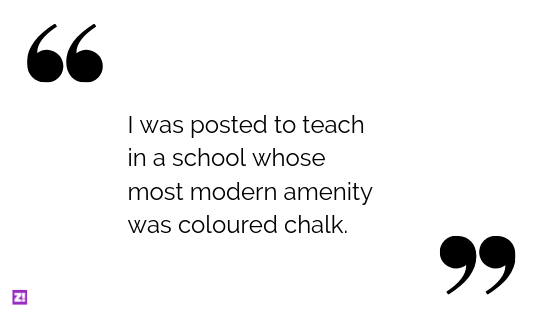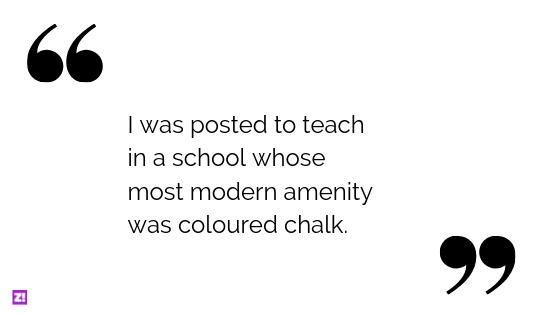
To get a better understanding of Nigerian life, we started a series called ‘Compatriots’, detailing the everyday life of the average Nigerian. As a weekly column, a new installment will drop every Tuesday, exploring some other aspect of the Nigerian landscape.
This week, a former corps member gives a brief recount of his experience as a teacher in one of Nigeria’s neglected institutions and the lessons this experience taught him.
In 2015, freshly graduated with a degree in Environmental Science from a rather pricey UK university, I returned to Nigeria for my service year. In my estimations, I had one year of rocking poorly-tailored khakis with fanny packs, community building projects and shouting ‘corper wee’ without provocation, cut out for me. My heart was brimming with excitement.

What I didn’t plan for, however, was having that excited, hearty real estate, getting overrun with disappointment, when I was posted to teach in a school so neglected by the government, its most modern amenity was coloured chalk.
If you recall, 2015 was the year the naira and the hopes of Nigerians locked fingers and took a simultaneous jump off the back of a former dictator turned president. Our currency had just crashed and it appeared the only change our president was capable of bringing was bus fare. And yet somehow, I stayed optimistic, excited even, for my return to carry out the NYSC programme.
Which is why rather than ‘runs’ my way through three weeks of camp and the entirety of the programme as was repeatedly suggested to me, I spent three weeks in matching whites — learning drills, dodging soldiers and unwinding at the mammy market, leaving my posting and the rest of my service year purely to chance. When fate struck and declared my place of primary assignment as *SunnyVille Group of Schools, located in a never before heard of part of Ogun State, I was only too happy to oblige.

On my first trip to my PPA, I had no idea what to expect, so I let my optimism get the best of me. When the bustling, traffic-heavy landscape of Lagos gave way to the lush greens of Ogun State, I was thankful for all the fresh air I’d be taking in. When we arrived at the buka-laden community where the school was located, zero fast-food restaurants in sight, I whooped at the opportunity to eat only traditional meals for a time. But when I came face to face with what was to be my workplace for the next year, my good cheer started to glitch.
Imagine a shoe box, scaled up for humans, but just barely. Per a rusty, rundown sign outside of it, SunnyVille was a primary and secondary school, a fact I had to confirm by venturing in, without any permission.
To my surprise, this government approved school had students between the ages of 10 and 18 learning in classes divided by thin planks of wood to maximise space. Signs written in chalk announced doors leading to three classes: basics, junior and secondary schools all jumbled together. The floors were made of untiled concrete, the kind you had to water before sweeping. There were almost no windows in place, and the school was lit purely by natural light. A disconnected line outside and subsequent communication informed me that Sunnyville and its students had been without electricity for close to a year.
When I found my way to the proprietor, I asked what kind of extra-curriculars were in place for the students, to which he confusingly responded that all his pupils were hard working. He informed me that Jss 3 and SS 2 were in different terms from the rest of the school, and yet somehow didn’t think it odd that students were learning in such an unsuitable environment. To him, they had to make do with what they had.
And since 1973, the Nigerian government has been reading from the book of ‘Making Do’ — placing incompetent corps members in charge of the formative learning stages of student life. It is how I, a grossly unqualified Environmental Science degree holder came to teach civil studies and basic science to primary school students. And agriculture, geography and biology to secondary school students. The remainder of the Sunnyville teaching staff consisted of even more corps members and only four permanent staff members.
In my service year, I taught classes of students who were tickled by the thought of learning with computers. Who couldn’t help but shy away from a laptop when I brought it in to demonstrate its teaching and learning possibilities. Students who genuinely believed their requirement to clear surrounding grass with hoes and rakes in the generation of lawnmowers was a necessary part of their education. Who remarkably, showed great patience when classes had to be paused when darkened rain clouds prevented visibility.
And yet somehow, like flowers blooming through concrete, these same students amazed me with their brilliance. In the latter part of 2015 and for the majority of 2016, I had the privilege of teaching children who never failed to ask the right questions, or give the right answers. Whose eagerness to learn, in spite of stifled conditions showed a resilience beyond their years. Under my charge, there were aspiring doctors, lawyers, engineers and even a writer. Aspiring professionals whose optimism and fiery ambitions could not be put out by a government or an educational system unconcerned with their progress.
If ever I needed an indicator that success could be made in spite of Nigeria, I only had to look to the rusty sign of the Sunnyville group.
*Name has been changed.




